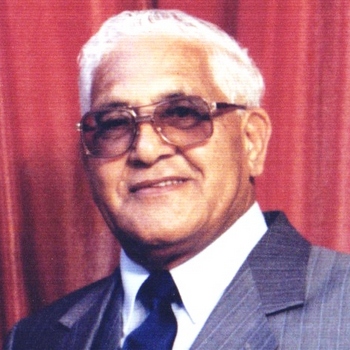DOCTOR OF PHILOSOPHY (HONORIS CAUSA) (POSTHUMOUS)
 The eldest of 12 children, Hassam Howa was born in 1922 in Bellville, Cape Town, into a large working class family. He matriculated from Trafalgar High School in District Six.
The eldest of 12 children, Hassam Howa was born in 1922 in Bellville, Cape Town, into a large working class family. He matriculated from Trafalgar High School in District Six.
His father Yusuf, a member of the South African Indian Congress, deeply influenced him. The Congress stood for justice, equality and non-racialism - ideals that became engrained in, and shaped Howa’s own life.
Sport played a vital role in Howa’s community and in his own development. Living at a time of social hardship and increasing discrimination, sport offered purpose and dignity and provided opportunities for achievement and personal development. Howa participated in rugby and boxing, but cricket was his passion. He started playing cricket in his teens, playing for Sunlight Cricket Club, then Everton and later the St John Cricket Club. After a memorable amateur career on the pitch, he took up the challenge of cricket administration and the promotion of the sport. He is well remembered for this and his strong leadership.
In 1947, Howa became a founder member of the SA Cricket Board of Control (SACBOC), which worked resolutely to promote cricket among the dispossessed and the oppressed. Strongly influenced by the political movements of the Western Cape with its long-standing tradition of principled opposition to racism, Howa found himself becoming the voice of equality and of non-racial sport in South Africa, resolutely refusing to co-operate with the Apartheid-endorsed cricket establishment.
Through SACBOC, he led a fearless campaign throughout the 1970s against "white" cricket. Having galvanised the support of communities and community organisations in South Africa and with the support of kindred international organisations, the campaign succeeded in ensuring that the Springboks were banned from participation in international cricket.
As the leader for the South African Sports Council (SACOS) – the over-arching sports body to pursue non-racial sport - he lobbied for South Africa's expulsion from world sport under the slogan: no "normal" sport in an abnormal society. Howa founded the South African Cricket Board (SACB) in 1976, in opposition to the merger between SACBOC-SACU (South African Cricket Union) and the multi-national sports policy. He served as President of the Wynberg and District Cricket Union (later Cape and District Union) for 24 years and as the President of the Western Province Cricket Board for 22 years.
An accomplished pianist, Howa continued to play cricket and swim right into his sixties. He passed away on 12 February 1992. He is survived by his wife, nine children and 12 grandchildren.
In 2004, he was posthumously recognised for his vast contribution to sport in South Africa, and awarded the Order of Ikhamanga in Silver for "his excellent contribution to the struggle for and the development of non-racial sport in South Africa". He was also awarded the Order of the Disa in 2004 and in 2006; he was inducted into the South Africa Sport and Arts Hall of Fame.
In recognition of his fundamental belief in a non-racial society and his devotion to the development of non-racial sport in South Africa, within the broader context of social justice, it is an honour for Nelson Mandela Metropolitan University to confer the degree of Doctor of Philosophy (honoris causa) (posthumous) on Hassan Howa.